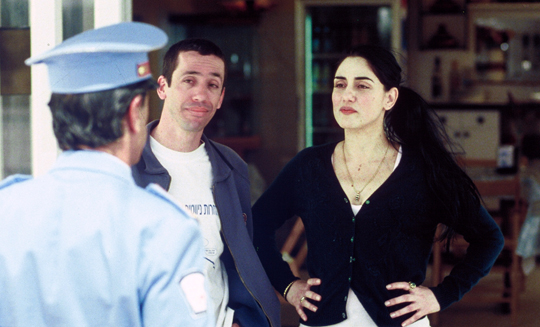

Reviews of Recent Independent, Foreign, & Documentary Films in Theaters and DVD/Home Video
Written & Directed by Eran Kolirin. Produced by Eilon Ratzkovsky, Ehud Bleiberg, Yossi Uzrad, Koby Gal-Raday & Guy Jacoel. Director of Photography, Shai Goldman. Edited by Arik Lahav Leibovitz. Music by Habib Shehadeh Hanna. Released by Sony Pictures Classics. Language: English, Arabic & Hebrew with English subtitles. Israel/USA/France. 89 min. Rated PG-13. With Sasson Gabai, Ronit Elkabetz, Saleh Bakri & Khalifa Natour.
Inspired by Egyptian playwright Ali Salem’s description of getting lost overnight in Israel,
first-time writer/director Eran Kolirin charmingly brings influences from Jim Jarmusch and Mike Leigh to cross-cultural, slice-of-life
absurdities.
The Alexandria Ceremonial Police Orchestra arrives at the Tel Aviv bus station in full-blue, epauleted regalia at a time of cautious optimism in
Israeli-Egyptian détente. They are more professional than the colliery band in Brassed Off (perhaps the “academy” the band members attended per
the English subtitles was a music conservatory rather than for police training), but they face the same threat of budget cuts if they don’t prove
their continued worth. So when no one shows up at the airport to take them to their scheduled performance, martinet director Tewfiq (Sasson Gabai) and his frustrated
deputy conductor are resolute to successfully accomplish their goodwill mission, and halfheartedly agree to let cocky young Khaled (Saleh Bakri),
whose English skills seem learned from Chet Baker records, negotiate getting them to their destination.
But the mishaps multiply as the Arab language has no “P” sound, so instead of the bustling suburb of Petah Tikva, they end up in Bet Hatikva, a
desolate development town in the Negev Desert. When Tewfiq asks at a café for directions to the Arab Cultural Center, Dina (Ronit Elkabetz) cynically
sets him straight about being in the middle of nowhere, where “There’s no culture at all.” Stranded, hungry, and thirsty,
the proud Tewfiq is forced to accept her hospitality, first for refreshments, and then very reluctantly for accommodations, which she rustles up by
parceling the eight band members up between her small apartment and a couple of her nonplussed customers.
The miscommunications just start with language. The Israelis are confused by the very notion of the ensemble. One passerby assumes they are a
Salvation Army band and sympathetically gives them change. Dina supposes they play martial music. Though frustrated by their mutual use of pidgin
English, the Israelis and Egyptians find that music works as a universal language – they can all join in on singing Gershwin’s “Summertime” and be
moved by an unfinished sonata.
But to cross the cultural divide, stereotypes have to be surmounted in the evening’s odyssey around the lonely landscape – the band members are
discomfited that the café is decorated with souvenir photos of Israeli soldiers conquering the Sinai, and Dina projects her childhood crush on
Omar Sharif to Tewfiq. Elkabetz is even sexier here with her clothes on than she was naked in Late Marriage, and Gabai, who was the romantic
hostage in Tel Aviv Stories, is very appealing as a repressed widower. However, some, but not all, of the humorous and touching explorations and revelations between the band and
their hosts are predictable.
Less overtly political than The Syrian Bride as a portrait of language and cultural confusion in the Middle East, The Band’s Visit
shares the sweet humanism of strangers in a strange land found in Wales by The Englishman Who Went Up a Hill, but Came Down a Mountain, in
Scotland by the Local Hero, and in Australia by The Coca-Cola Kid.
Nora Lee Mandel
|